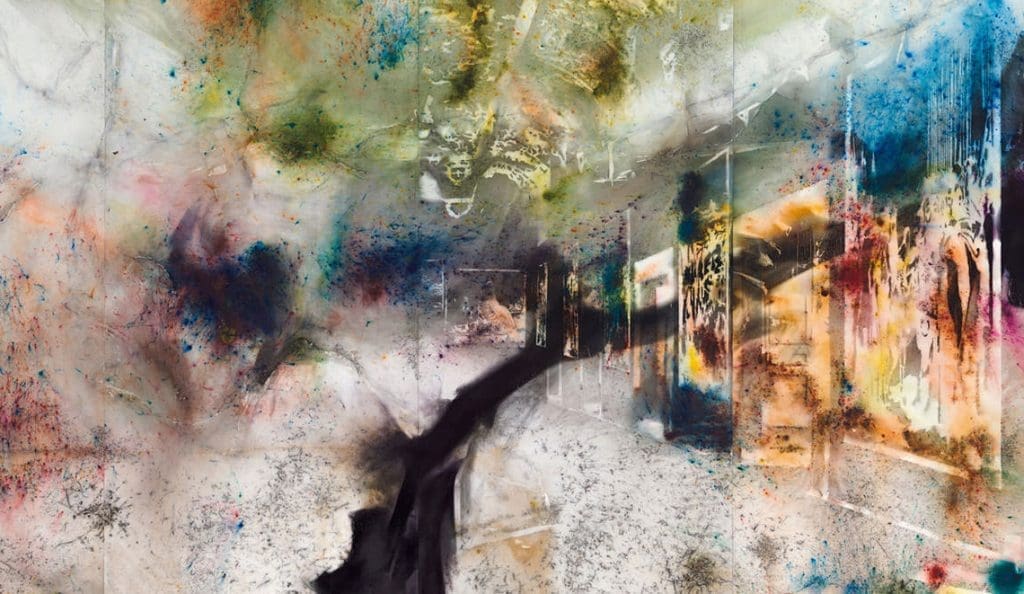Transcribed from the 16 June 2020 episode of This is Hell! Radio (Chicago) and printed with permission. Edited for space and readability. Listen to the whole interview:
What is actually going on is the creation of a surrogate form of divinity. It’s not the abolition of divinity. It’s a repression, a displacement, and a renaming of divinity—and of our desire for it.
Chuck Mertz: With capitalism and the pursuit of profits we disavowed our enchanted past of divinities and connection to the spiritual world in exchange for one commodified into a market. But what if capitalism and its money are just as much witchcraft as any practice preceding the market? Here to explain, Eugene McCarraher is author of The Enchantments of Mammon: How Capitalism Became the Religion of Modernity.
Welcome to This is Hell!, Eugene.
Eugene McCarraher: Good morning, Chuck, I’m happy to be here.
CM: You write, “Once upon a time, the world was enchanted. Rocks, trees, rivers, and rain pulsated with invisible forces, powers that enlivened and determined the affairs of tribes and empires as well. Though beholden to the caprice or providential design of a variety of spirits of deities, the world of enchantment could be commanded by magic or humbly beseeched through prayer. But with the Reformation, the Enlightenment, and industrial capitalism in Europe, the company of spirits was evicted from the cosmos.”
What changed to go from enchantment to power? Were there simply too many people, or too few resources, or a combination of both? Was profit a necessary and inevitable escape from some kind of misery that was imposed during the world of enchantment?
EM: The story that you just outlined has been entitled the disenchantment of the world. It’s a term that Max Weber used. It’s still one of the most fundamental assumptions of modern cultural and intellectual life. What changed, or at least what began to change, was the Protestant Reformation, and specifically Calvinist theology. In Calvinist theology, we begin to lose this enchanted or sacramental perspective, the idea that matter can mediate the presence of god in the world.
Also essential to the enchanted worldview is the idea that our desires and our morality are in fact embedded in the ontological framework of the universe: that our highest values aren’t simply subjective, they’re actually part of the architecture of the cosmos.
Calvinist theology doesn’t so much cause capitalism—that’s preposterous—but it clears a space for money and pecuniary reasons to take the place of god as the arbiter of what is good and true and beautiful in the world. This is one of the basic reasons I think the disenchantment narrative doesn’t work. What is actually going on is the creation of a surrogate form of divinity. It’s not the abolition of divinity. It’s a repression, a displacement, and a renaming of divinity—and of our desire for it.
Enchantment, in that traditional sense, is usually something that is considered to be destroyed by science or languishes in the face of technology, or it finds a refuge in our privatized religious cultures in liberal democracies. This narrative is able to work because it does seem to comport with much of our daily experience: businesses don’t make decisions based on horoscopes; people don’t hire workers or buy new equipment based on what they saw in an apparition of the virgin Mary or something. But money has, over the last four or five centuries, really come to define not just our ethics but our very standard of what is real. It reaches its pinnacle—actually its nadir, it’s lowest point—in neoliberalism.
CM: You write, “Nothing seems more thoroughly secular than the modern business corporation, the leviathan of the twenty-first century and the preeminent institution of our gilded age. To its admirers, the corporation is the servant of a democratic market, an unfairly maligned and underappreciated creator of abundant commodified marvels. To its detractors, it is a remorseless Gargantua despoiling the planet in an insatiable globe-encircling syndicate relying on mendacity and exploitation. Yet both admirers and detractors of the corporation agree on its thorough disenchantment: they must organize every factor of production, from fiber optic cables and human resources to the dreams of the ad department, and calibrate the marginal utility of every expenditure, exertion, and longing. No beatitudes here, no works of mercy, no yearning for paradise.”
Why is the thoroughly secular so potentially—relative to the previous age of enchantment, if you will—merciless?
EM: It has to be. They set up a surrogate divinity. What I’m calling “Mammon” here is probably the most unforgiving divinity ever. Money is not only the standard of what is good in capitalist civilization, but also of what is real and what is imaginable. Money never sleeps. Money takes no prisoners. Money leaves the weak behind.
So there is a kind of morality in capitalism, but it is an utterly cruel, ruthless, and avaricious one. There can’t be any mercy in a capitalist system. What mercy we do see is the residue of waning or still extant religious cultures. Capitalism itself is utterly cruel and rapacious. It can’t possibly be merciful.
CM: Is money at odds with religion? Is that confrontation over? Is it ongoing? Are enchantment and profit in conflict then, now, and forever?
EM: Yes. It always has been and always will be, because money is a kind of surrogate divinity. This is an idea that we see in antiquity—I trace it through the Middle Ages. We even see it in someone as self-consciously secular as Karl Marx, who openly refers to money as the god among commodities. He talks about the divinity of money in several of his writings—especially his youthful writings, but also in Capital he talks about money possessing divine, godlike qualities.
Money is not secular. The psychoanalyst Norman O. Brown draws on a lot of psychoanalytical, anthropological, and historical literature to make the point that money is not in fact secular: it originates in the realm of the sacred. I would reject the idea that money is secular. It actually has powerful religious qualities.
Once again this is where the laity are going to have to teach their ecclesiastical leaders how to be Christians again.
CM: Why do we need to be enchanted, seemingly, whether it’s by religion, by the enchantments of the pre-capitalist world, or by profit? Why do we need to be enchanted? What explains that desire to you?
EM: I should put my religious cards on the table here. As a Christian, I think that enchantment or, for me, a desire for the sacramental—a desire to experience the divine in the everyday—is just part of our human nature. It’s the way we’re made. Since I think that a desire for the sacramental and a desire for divinity is part of our nature, we’re going to be enchanted by something. We’re going to have that longing fulfilled by something. The longing for enchantment in capitalist civilization is fulfilled (or I guess I should say mis-fulfilled) by money, which is set up as an arbiter of what’s good and true and beautiful.
I sometimes use the term misenchantment to characterize capitalist civilization.
CM: Is there any way not to be a follower of Mammonism? Is it possible for us to live outside of Mammonism? People who might think they are atheists and do not believe in any religion in a way are just as complicit and compliant, just as we are within racism or capitalism—we’re all complicit and compliant within Mammonism.
Are we all believers in a religion whether we recognize it or not?
EM: Yes. Even people such as myself: as long as we’re trapped in a capitalist civilization, we are going to be devotees to some degree. We’re going to be forced to be acolytes of this religion of Mammonism.
We can be more or less conscious of this. To that extent I suppose one could say you could become disenchanted by Mammon, or with Mammon. But as long as we have a capitalist system, all of us are going to be enslaved to it in some way, and the point is to resist and transform that system knowing that you’re still yoked to it to some degree.
Even people who would consider themselves atheists are in fact complicit—and all of us should join to try to overcome and transcend this system.
CM: It would seem that Mammonism is very much contradicted in all of the world’s major religions. Has profit commodified religion? And if so, what happens to religion when it is commodified? How does our relationship with religion, with the enchanted, change?
EM: It changes in different ways. One example would be evangelical Protestantism. Chris Lehmann has called it the “money cult.” Evangelical Protestantism is a great form of Christian enchantment for the entrepreneur, for the self-made person. In many ways, evangelical Protestantism basically blesses Mammonism. It puts its imprimatur on it. Especially a religion such as Mormonism—and especially early Mormonism—is saturated with pecuniary values.
Other forms of Christianity—Roman Catholicism, more liberal forms of Protestantism—and Judaism all have made their accommodations with Mammon to some degree. God and Mammon have been forced into a partnership—a very lucrative one in fact. The form that this usually takes is to either accept the fact that we are sinful people and therefore capitalism is the best we can do (therefore acknowledging something about the iniquity of the system), or we find a way to distort all sorts of New Testament texts to make capitalism not just acceptable but even somehow divinely ordained.
Organized religion, institutionalized Christianity in particular, has pretty much made its peace with Mammon, which is why I don’t see any of the institutional churches, certainly not their leadership, taking any great leadership in fighting the system. Once again this is where the laity are going to have to teach their ecclesiastical leaders how to be Christians again.
CM: You write, “Marx and Engels wrote of capitalists in the Communist Manifesto, ‘it’s like the sorcerer is no longer able to control the powers of the netherworld he has called up by his spells.’ Later, in the first volume of Capital, Marx included a seminal passage on the fetishism of commodities: the attribution of human or supernatural qualities to manufactured objects.”
Did profit overcome a world of the supernatural by giving supernatural power to the outcome of profit like manufactured objects? If so, why can’t we have that same kind of reverential awe for something that is less intrusive, like the natural world, instead of the enchanted world of profit?
A lot of American history has essentially been an attempt to build a beloved community on the foundation of capitalist property relations. It’s a project that’s doomed from the start.
EM: We can, and in some ways we already do. The sacramental imagination is key to this. The way I use the term sacramental is not simply to denote the rituals of a particular church; the sacramental imagination or perspective is one that sees all material reality itself as being capable in some fashion of connecting us to the divine. In the Middle Ages, of course, the sacramental imagination was defined by the Catholic church. But in modernity, the refuge outside of organized religion for the sacramental imagination is what I call romanticism: I don’t think it is simply a literary and artistic movement of the early nineteenth century. It is a crucial component of all of modern culture. It names a sense that there is in fact more than the material world, and it conveys something to us of the beyond, of the divine.
We see romanticism in a lot of movements in the nineteenth and twentieth century. In fact we see a great deal of romanticism in the contemporary ecological movements that have revived since the 1960s. We are in fact to some degree enchanted by the natural world. We do love it. A lot of us do sense something in the beyond that is conveyed to us through every day material life.
One of the most important tasks of our time is in fact to be more materialistic, not less. What I mean by that is appreciating the sensuous and delightful qualities of the material world, to which industrialization and capitalism have done a great deal of damage by turning everything into a commodity and measuring it by this pecuniary ontology and morality.
CM: How is that appreciation of the material world different from what people might see as hyperconsumerism?
EM: I’m frankly tired of people talking about consumerism, for a number of reasons. Anti-consumerism is just a tiresome, ineffectual form of moralism. It’s just another form of finger-wagging. Don’t buy so much. Don’t consume so much! To which the answer is just frugality and thrift—which is kind of boring, as well as joyless.
Talking about consumerism is actually a way of not talking about capitalism. Consumerism, first of all, is a structural necessity of the system. You want people dissatisfied, as a capitalist, so that they come back for the next hit, for the next commodified good. That’s one reason that talking about consumerism is utterly boring. The other reason is that when we want somebody to be “non-materialist” or “anti-materialist,” it flies in the face of reality. We are material creatures. We need material things not just to survive but to express our love and our care for each other.
I think we should develop not so much an anti-materialism but a better materialism, a more capacious and loving kind of materialism. Because we’re material beings. We shouldn’t beat ourselves up for being “materialist.”
CM: Is the gospel of Mammonism a scam? Is it a pyramid scheme? Is that a fair way to describe it?
EM: It is, but it’s so much more, and that’s what makes it so dangerous. If it were only a Ponzi scheme, we’d have a fairly good way of discerning that it was and therefore understanding how to deal with it. But it goes much deeper than that. There is a real moral and ontological disorder here which, if you follow it out all the way (as our leaders have been trying to do for the last forty years), it’s going to lead to ecological and civilizational collapse.
When the cards do fall, it’s going to be horrible, which is why it’s so imperative, especially at this time, right now, to start thinking anew and start acting anew.
CM: The United States says we do not have any state religion, but it does sound like Mammonism is the state religion of the United States. Is this current state of Mammonism—is it fundamentalist? Does Mammonism punish heretics and those who would go against it?
EM: Sure it does. First of all, it punishes its own believers. It’s called unemployment, it’s called your business fails. It’s called only getting one $1200 check when you need so much more to survive. It also blesses its acolytes and enriches them. It hands the keys to the treasury to them. It is the state religion. It is the established faith. Those who are its prelates and its theologians are going to fight tooth and nail to impose this faith on the rest of us. And it’s going to be particularly ferocious since that faith is waning or being shaken by current events.
CM: You write, “The world does not need to be re-enchanted, because it has never been disenchanted in the first place. Capitalism has been a religion of modernity, one that addresses the same hopes and anxieties formerly entrusted to traditional religion.”
What hopes and anxieties did enchantment address that you see capitalism addressing today? I’m also curious if the religion of modernity is and always has been in a kind of religious war.
EM: Yeah, I think that’s a great way to put it. This has been a conflict of enchantments for the last four or five hundred years. The hope and anxiety that money and capitalism at least try to address (and always fail to address) is our longing for divinity, which is fundamental to our nature. We want to live in a world in which we love one another, in which we love god—and capital and money try to do that for us. They can’t. In fact, they will inevitably and horrifically set us against each other.
What money has successfully done, at least in American civilization, is co-opt religion itself. A lot of American history has essentially been an attempt to build a beloved community on the foundation of capitalist property relations. It’s a project that’s doomed from the start. A lot of our history has been, in other words, a failure.
CM: What kind of spiritual longing do you see inscribed in the imagery of business culture that the observer may not recognize as spiritual?
EM: In the imagery and vocabulary of business culture—not just today, but especially in the last hundred years—is a longing for beloved community which is inscribed in a lot of management literature (just to choose one genre). Management literature is often depicted as a really boring and dreadful kind of writing—and a lot of it certainly is. My god, I read enough to know that. But when we look, for example, at a lot of the most important management theorists (whether it’s Frederick Taylor, Mary Parker Follett, or Peter Drucker), we see a very self-conscious attempt to provide an ethics and a morality which will make the workplace not simply a site where you just do your job, but also a place where you get along with each other, where you love one another. The language of love is actually used. The language of communion—you actually see it in a lot of management literature.
As far as advertising imagery, it’s all over the place, especially in the twentieth and twenty-first centuries. I’ll give you an example (it’s an image that will always stick with me): one night in the late nineties I was in my hotel room at the American Historical Association, watching television, and a Microsoft ad came on. It did not show any computers. What it showed was an older African-American woman sitting on a bench with her arms held to look almost like a Hindu goddess; she was encircled by a bunch of playful, joyous children; all of this is in slow motion. I thought, what the hell is Microsoft doing here? What is going on here?
Those are the kinds of images that made me think there is more to advertising than simply selling stuff. Advertising is selling you a world. It’s selling you a sensibility. Sociologist Michael Schudson coined the term capitalist realism back in the eighties, as the analog to socialist realism in the 1930s. What we’re seeing here is not just capitalist realism, but a kind of a search for what theologians used to call a beatific vision. Advertising is showing you not just the world but the world as it should be, the world as it ought to be, you as you ought to be. It’s iconography.
We should think about progress in terms of human flourishing rather than simply the gross domestic product.
CM: You write, “The grotesque ontology of scarcity and money, the tawdry humanism of acquisitiveness and conflict, the reduction of rationality to the mercenary principles of pecuniary reason—this ensemble of falsehoods that comprise the foundation of economics must be resisted and supplanted. Economics must be challenged not only as a sanction for injustice but also as a specious portrayal of human beings and a fictional account of their history.”
We always talk about the myths of exceptionalism and innocence when it comes to US history here on our show. How does economics give a mythical or fictional account of human history?
EM: It’s so thoroughly untrue, economics. One thing I always say to students, especially business students, is that when you take an economics course, for the first couple of days you are actually sitting in philosophy class and you are learning ethics and ontology. They never think about it this way. They think they’re learning economics. Yes, you’re learning economics—and you’re also learning philosophy. First of all, the notion of scarcity is an ontological assertion. You are making a statement there about the way you think the world is.
What derives from that is the second postulate, which is that human beings are simply rational self-seeking utility-maximizers. I don’t know about you, but I’ve never met a rational self-seeking utility-maximizer. And if I ever do, my god, I’d run the other way. Both of these assertions are not just dismal—Thomas Carlyle once called economics the “dismal science”—but they’re fundamentally untrue. I’d even go so far as to say that John Ruskin, the great nineteenth century art and social critic, was right when he compared economics to alchemy and astrology.
Economics, if it’s going to survive as a discipline (if it even should survive as a discipline), is going to have to thoroughly deconstruct its ontological assumptions and its assertions about what human beings are.
CM: You point out that “Romantic social criticism did not claim the imprimatur of science as did Marxism and other modern social theories, yet the Romantic lineage of opposition to disenchantment and capitalism has proved to be more resilient and humane than Marxism, progressivism, or social democracy.”
If that resilience is the case, then why is Romanticism not part of the discussion and debate today? Why do we hear so much about Marxism and social democracy, and nobody’s looking back to Romanticism?
EM: It’s partly because Marxism and social democracy are basically the best darn tools that we have. I want to make a caveat that I’m not arguing that Marxism and social democracy are therefore utterly bankrupt political and ideological traditions. I don’t. I draw upon Marxism for this book as much as I critique it.
But part of the problem is that the left has had a certain amnesia about this. One of the reasons I wrote this book was to cure that historical amnesia. Capital-R Romanticism has been a part of the left in the past, and if it’s going to be sitting at the table for any discussion we have to remember that. This book is not just an account of capitalism as enchantment. Running through it is also a counternarrative about the left.
CM: What is progress, if not the next new iteration of one of our current gadgets or platforms? How should we be looking at progress as not just the next gadget?
EM: We should think about progress in terms of human flourishing rather than simply the gross domestic product. If we took human flourishing and workers’ control over production and care as our measures of progress, we would get a different kind of technical development; we would get a different kind of politics; we would get better and more generous measures of justice and community.
Part of the way we’ve been taught to define and measure progress has been sheerly numerical. We have more things, they’re quicker, and they’re all quantitative. There always has been a more qualitative criterion for progress. There’s a distinction Ruskin made which I’ve always found invaluable between wealth and what he calls illth. Wealth is production and care that actually enhances human relationships and enhances human beings, whereas illth is what destroys them or injures them. That is a better criterion for progress than the GDP or how quickly your computer starts up, or how many new-fangled bells and whistles I have on my smartphone.
CM: You write, “Under the regime of neoliberalism, realism has been the chief weapon in the arsenal of what David Graeber has characterized as a war on imagination, a relentless assault on our capacity to envision an end to the despotism of money.”
What are we told is outside the realm of realism but in your opinion is very much within realism?
EM: A decent life. Graeber is absolutely right that one of the projects of neoliberalism has been to tell people: yeah, life kind of sucks under neoliberal capitalism, but this is as good as it can get. Therefore, don’t even think about working less. Don’t even think about redistribution of wealth. Don’t think about any of those things. “War on the imagination” is a perfect description of a big part of neoliberalism over the last fifty years.
If there’s anything good that comes out of these quarantines and lockdowns, it’ll be that we realize more than ever how much we need each other. One of the hopes that might come out of this pandemic is the question, “Why does life suck so much?” We’re told that we can’t do any better, because, well, shareholder value.
CM: How dependent are we on the misenchantment of money for our very survival? Must we believe in money, must we believe in the faith of Mammonism because if we do not believe, money will punish us by going away, leaving us for dead, just like many fear a deity abandoning them?
EM: We have to believe at least in the sense that we have to use it every day. We’re trapped. We’re enslaved. To that extent there’s no way out. I have to buy things, you have to buy things, which means we have to, in some fashion, accept the evaluation of reality in terms of money. That’s simply a given.
But to the extent that we become aware of the ways this disfigures and poisons our relationships to each other, I think we can live outside it in a kind of ironic mode. But I don’t want us to simply be ironists. I want us to seek opportunities to dismantle and transcend this system.
I agree, we’re trapped in hell. But there are ways to think, and possibly struggle, our way out of it.
CM: Eugene, I really appreciate you being on the show.
EM: Sure, my pleasure.
Featured image: anticapitalist heathen enchantment in the postmodern world





